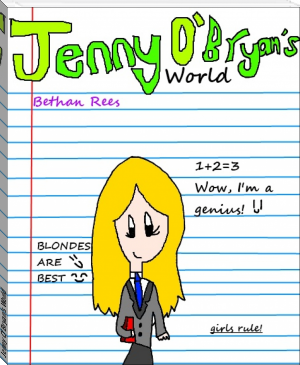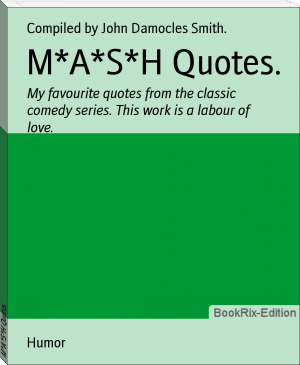The History and Records of the Elephant Club by Doesticks and Underhill (android based ebook reader TXT) 📗

- Author: Doesticks and Underhill
Book online «The History and Records of the Elephant Club by Doesticks and Underhill (android based ebook reader TXT) 📗». Author Doesticks and Underhill
During the various narrations which were given during the evening, Mr. Quackenbush remained seated in the corner, saying nothing and doing as much. His eyes were partially closed, and an occasional sigh was all that escaped him.
When Mr. Dropper concluded the reading of his contributions, it was moved that Mr. Quackenbush open his mouth, and say something, under the penalty of having it pried open with the poker.
This caused Mr. Quackenbush to open his eyes; and, after various preliminary hems and coughs, he announced that there was a certain rule of evidence which gave a witness the right to refuse to say anything tending to criminate himself. He should avail himself of that rule. Having said these words, Mr. Quackenbush rolled over on the floor, drew himself into double bow knot, and was soon snoring against noise.
In the meantime Mr. Spout had taken the floor, and stated that he had on one occasion been over at the Essex Market Police Court. He was there the involuntary witness of the trial of a case, which might account for the non-communicative disposition manifested on the present occasion by Mr. Quackenbush. During the proceedings, the justice called[Pg 279] out the name of R. Percy De Laney Blobb; and in response to the call a tall individual arose and came forward. "I thought I recognized in the individual in question," continued Mr. Spout, "a person whom I had seen before, and I was not mistaken. He was wild, and disposed to regale the assembled company with a numerous collection of songs, which he had at his tongue's end. His dress was much disarranged.
"The evidence of the officer who had arrested the tall gentleman, went to show that he had offended against the laws, by disturbing the rest and quiet of an unappreciative neighborhood, by bawling forth at midnight most unmelodious yells, which, when he was apprehended, he assured the officer were capital imitations of Sontag, Grisi, and Grisi's new baby. When arrested the individual was in a plebeian state of drunkenness—not so much so but that he could sing, as he called it, and could talk after an original fashion of his own. His ideas were slightly confused; he informed the officer that he had been to hear Louisa Crown sing the Pyne Diamonds, and that he met a friend who took him to a billiard shop to see a clam race; that he and his friend bet the whisky on the result; that he drunk for both, and that they had passed the remainder of the evening in a 'magnori[Pg 280]ous manner,' singing 'Storm Columbus,' 'Yankee Boodles,' and the 'Scar Strangled Bladder.'
"The officer had taken him to the lock-up, where he had finished the night singing 'Good Old Daniel,' whistling the 'Prima Donna Waltz,' and playing an imaginary piano-solo on the floor, in which attempt he had worn off some of his finger-nails. When he was before the court he had not yet recovered his normal condition. He was still musically obstinate, and refused to answer any questions of the Judge, or make any remarks, except in scraps of songs, which he sang in a low voice, mixing up the tunes in a most perplexing manner. Being possessed of an excellent memory, and having a large assortment of melodies at his command, his answers were sometimes more amusing than relevant. The Judge proceeded to interrogate him somewhat as follows:
"Judge.—What is your name, sir?
"Prisoner.—'My name is Robert Kidd, as I sailed'—
"Indignant Officer.—He lies, your honor. Last night he said his name was Blobb.
"Judge.—Where do you live?
"Prisoner.—'Erin, Erin is my home.'
"Knowing Officer.—He isn't an Irishman, Judge;[Pg 281] he's a Connecticut Yankee, and lives in East Broadway.
"Prisoner.—'That's eight times to-day you have kissed me before.'
"Officer.—Please, your honor, he's an octagonal liar, I didn't.
"Judge.—Where did you get your liquor?
"Prisoner.—'Way down south in Cedar street; rinctum'—
"Judge (to officer).—What's that he says?
"Attentive Officer.—At Ringtown's in Cedar street.
"Judge.—What number in Cedar street?
"Prisoner.—'Forty horses in the stable.'
"Officious Officer.—Ringtown's, No. 40 Cedar street, your honor.
"Prisoner.—(Voluntary remark, sotto voce.) 'A jay bird sat on a hickory limb—he winked at me and I winked at him.'
"Indignant Officer.—Who're you winkin' at?
"Prisoner.—'Nelly Bly, shuts her eye.'
"Officer.—You'd better shut your mouth.
"Judge.—What have you got to say, prisoner?
"Prisoner.—'Hear me, Norma.'
"Officer.—Well, go on, go on.
"Prisoner.—'O blame not the bard.'[Pg 282]
"Judge.—Nobody to blame but yourself.
"Prisoner.—'Did you ever hear tell of Kate Kearney?'
"Knowing Officer.—Keeps a place in Mott street, your honor.
"Prisoner.—'O! O! O! O! O! Sally is the gal for me.'
"Judge (to officer).—Who is Sally? Some disreputable female I suppose.
"Officer.—She went up to the Island to-day, sir.
"Prisoner.—'O tell me, where is Fancy bred.'
"Judge.—I don't know anything about your fancy bread, if you have anything to say, go on.
"Prisoner.—'We'll all go bobbing around.'
"The Judge here became indignant, and demanded if he had a friend to become bail for him, to which query the prisoner hiccuped out,
"I'll never, never find—a better friend than old dog Tray.'
"Judge.—Can't take him, he is not responsible.
"Prisoner.—'I give thee all, I can no more.'
"Judge.—It won't do, sir, I shall fine you $10.
"Prisoner.—'That's the way the money goes—pop goes the weasel.'
"Indignant Officer.—I'll pop you over the head presently.[Pg 283]
"Prisoner.—'There's whisky in the jug.'
"Officer.—You'll be there, too, shortly.
"Judge.—If you can't pay you must go to jail.
"Prisoner.—'Give me a cot in the valley I love.'
"Judge.—Very well, sir, I'll do it. Tombs, ten days.
"Prisoner.—'I dreamt that I dwelt in marble halls.'
"The officer was about removing the individual below, when I came to the rescue, and informed the Judge that the prisoner was a friend of mine, that this was the first occasion in which he had ever manifested such eccentricities, and if he would let him off from the punishment this time, I would take him to his home and see that he never disturbed the city by his yells in the future.
"The prisoner turned his eyes upon me, and again broke out:
"'Good news from home, good news for me'——
"'Mr. Blobb,' said the Judge, 'if I let you off this time, will you cease going on these drunken sprees?'
"Prisoner.—'I'll touch not, taste not, handle not, whate'er intoxicates.'[Pg 284]
"Judge.—I hope that when we meet again it will be under more favorable auspices to yourself——
"Prisoner (interrupting).—'Meet me by moonlight alone, and I will tell thee.'
"Judge (resuming).—For you're in a bad plight now to appear among the ladies.
"Prisoner.—'Oh! I'm the boy for bewitching them.'
"Judge.—Not when you're drunk, I imagine.
"Prisoner.—'A man's a man, for a' o' that.'
"Judge.—You may go, sir. Good day.
"Prisoner.—'Oh, give to me that better word that comes from the heart, Good bye.'
"I managed to get my friend, Mr. Blobb, out of the court-room, and subsequently, with some difficulty, I succeeded in putting him to bed in my apartment, where I kept him for twenty-four hours, until he had recovered from his temporary aberration. He has since that time been in a normal state, except that he appears melancholy at times. He is well enough, however,——
"To be here this evening," said Quackenbush, interrupting; "for know ye that Mr. R. Percy Delancy Blobb is now before you in the person of myself, and I am here to-night to ask forgiveness,[Pg 285] which, if you don't give to me, I shall take immediate measures to expel you all from the club."
It was immediately voted that Mr. Quackenbush be forgiven, on condition that he would disclose the facts which led to his being found a prisoner in the Essex Market Police Court.
This, Mr. Quackenbush said he would do and do it now, and after finding room for a glass of ginger-wine, proceeded to narrate his experience.
He stated, substantially, that the whole difficulty grew out of a love affair. He had become deeply infatuated with an unknown and beautiful blonde. He had often met her in the street, in theatres, and concert-rooms, and his intense admiration ripened into a deep love. He was unable to learn who she was until a fortnight previously, when he found a friend who was well acquainted with her, and who undertook to bring about an introduction. Things wore a brighter aspect then. The sun was more brilliant; the moon shed a less melancholy light; lager bier tasted better; oysters appeared fatter; peanuts seemed always roasted just enough, and, in fact, he felt quite satisfied with life, and the world generally, and resolved to postpone indefinitely a purpose he had entertained of buying three cents' worth of arsenic. But a day or two before the scene[Pg 286] in the Police Court in which he figured, he found himself in a stage, and directly opposite was the identical object of his admiration and affection. He hitched from one side on his seat to the other; put one leg on the other, and then reversed them; looked out of the window, and then at her; scratched his ears; pulled up his collar; brushed the dust from his pantaloons; put his hands in his pockets; pulled them out, and did many ridiculous things which he would not have done had she not been present. She stopped the stage on one of the avenues, and handed him a five-franc piece to pay the driver. The driver, as usual, gave change in small pieces. He counted it to see that it was all right; found it to be so, and informed her of the fact. The streets being very muddy, he resolved to do the genteel in the way of assisting her out of the vehicle; made his exit; put one foot six inches into a mud-hole, and the other on the edge of the curb-stone; lifted the lady to the sidewalk in safety, at the expense of bursting off two suspender-buttons, and his vest-buckle, a slip down causing his nose to fall against the tire, his knees into the mud, his shoulder against the stage-steps, and caving in his hat. But all this didn't trouble him in the least, as he expected to be more than remunerated by an approving smile[Pg 287] on the part of the lady. He turned his face towards her, and found her engaged in counting the change, which he had pronounced to be all right, as if she suspected that he would be guilty of cheating her out of a stray sixpence, and thus hazard his chances for salvation. The effect of the disappointment, on him, was frightful. He felt a sickening sensation; stopped at the nearest whisky-shop, and imbibed; went to another, and took a nip; proceeded to a third, and smiled; reached a fourth, and took a horn; entered a fifth, and drank, and so on, ad libitum. At last he reached Niblo's; saw a flaming poster announcing that Louisa Pyne was to sing in the "Crown Diamonds;" bought a ticket; took several drinks and a seat. His ears had become unusually critical. Thought he could beat Harrison singing, and to satisfy himself, he rose up, and commenced to slaughter a piece, which Harrison had just executed. There was an evident want of appreciation of his abilities, for he was hustled out in double-quick time. He then went to a bar-room, and called for something to drink, which deliberate act was the last circumstance he remembered, previous to recognizing Mr. Spout in his room in the afternoon of the following day, when he inquired of that gentleman if he wouldn't be so kind as to pre[Pg 288]vent the nigger boy from striking him on the head with a poker, as he thought he had done it long enough.
A vote of forgiveness to Mr. Quackenbush was carried, after which the entire club went to sleep.
[Pg 289]
"Murder most foul, as in the best it is;
But this most foul, strange, and unnatural."
A FEW days after the events recorded in the last chapter, a new trick was invented to obtain under, false pretences, the money of the public. A number of needy and seedy individuals having been told that in England several of the most dis[Pg 290]tinguished literary men in that country had given a few theatrical exhibitions with great success, conceived the plan of exhibiting, in a similar manner, in the city of New York, a number of authors, artists and other celebrities, admitting the public at twenty-five cents per head. That it might look less like a humbug, and by way of hiding, as far as possible, the swindle which was only too transparent, after all, it was announced that the living poets and painters would be shown all alive in secure cages, undergoing a periodical stirring-up by the keeper,





Comments (0)